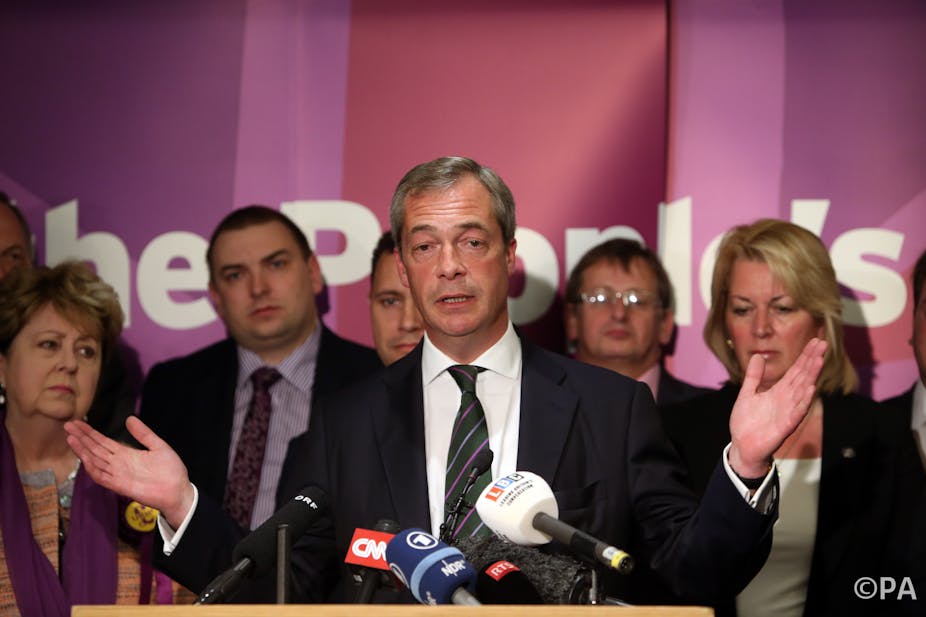To call Mike Read’s recently withdrawn UKIP calypso an appropriation of “black” culture is to do a disservice to the cultural traditions usually identified under that name.
Still, something grates about his sad performance, and to name it racism doesn’t identify the half of it.
One one level, this is just another gaffe, the latest failed attempt to identify UKIP with modern, multicultural Britain - hot on the heels of the shambolic Croydon rally earlier this year, in which the steelband booked to perform walked off when they learned who had booked them.
Others have called it an invitation to laugh at “black” cultures, a rebirth of the comedy of Love Thy Neighbour and It Ain’t Half Hot, Mum!, which many hoped had died out with the passing of Bernard Manning.
Of course, it’s not too much to say that it is both at once.
When today’s politicians embrace multiculturalism, it is often in the weakest terms, with the minimal threat to the prevailing cultural or political order: chicken tikka masala, we are proudly informed, is Ed Miliband’s favourite dish.
Following William Hague’s lead, we can now spot any number of party leaders sipping cocktails from coconuts at the Notting Hill Carnival. And more recently, Boris Johnson was heard singing Bob Marley’s Three Little Birds to a listening press pack: “Every little thing is gonna be alright”.
Our leaders embrace black culture often only in its most sanitised, least offensive forms: for their purposes, it is glitz, glamour, good rhythm and good vibes.
But it’s important to remember the distance these forms have travelled to become acceptable to the conservative multiculturalism happily embraced by today’s politicians.
Radical histories
In the 1950s and 1960s, as Caribbean music began to appear in British pubs, clubs and record stores, we would have been hard pressed to find a leading British politician embracing calypso, reggae or Rastafarian culture. In those years, the fight for decolonisation was coming to a head across the dwindling British Empire, and the emerging independent Caribbean states soon also faced their own political turmoil.
The cultures of the Caribbean poor were seized on by radical intellectuals in this moment as the repositories of a long and continuing historical struggle against colonialism and slavery. Within these cultures, it was supposed, lay the possibility of new political futures.
This is the history that “black” vernacular musical forms carry with them into our present. Calypso long acted as a vehicle for anti-colonial protest in the Caribbean, and as calypsonians set up camp in Britain in the 1950s, they often used their trade to deliver biting social and political commentaries.
Soon, calypso’s younger but bigger brother, reggae, took centre stage – and it was under this heavy bass beat that the idea of black vernacular music as a source of liberation politics came into its own.
In the Caribbean radical left’s drive for a new post-independence political order, these national cultural forms were embraced as emblems of the new society. Black music became the exemplar of a new “blackness”, a new mode of communal living and social equality. To separate social equality from this black music, so the thinking went, would be to remove the thing which made it “black” in the first place.
Conservative multiculturalism
Much has changed since these years – and much for the better. There is less of the unthinking narrowness that constrained what being “black” meant; we should not mourn the passing of this historical moment too uncritically.
And yet, something has been lost. When the BBC’s Rastamouse was pilloried for its perceived racial stereotyping, many of the accusations flying hither and thither were ultimately pretty stale. One, though, stuck in my memory: for Levi Roots, it was not the bad Jamaican accents or the clichéd Rastafarian slang which irked, it was the fact that one of the first children’s television shows to place black culture centre-stage was fronted not by a lion – a “strong symbol” – but by a mouse.
The readiness with which UKIP can release a bad calypso and try to pass it off as a commitment to multiculturalism shows how much gets lost when we disconnect the fight for racial justice from the fight for social justice.
In UKIP, we have the rise of a populist party of the right who don’t even aim to represent “the people” whom they so eagerly invoke, but who instead push policies that will ultimately serve to benefit the rich and big business.
To use for this project a “black” vernacular form originally meant to articulate the hope of a new, better world is to rob that form of the histories which make it most vital.
This is why it is not enough to read Mike Read’s calypso as racist and leave it at that. It is the mark of a far bigger irony – and a far bigger political confidence trick.

